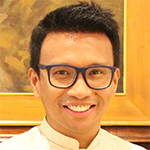

How convenient it is for many adults to blame the youth. They are the perfect scapegoat for the chaos around us. After all they walk out of their classrooms and take to the streets.
Look at the comments on social media and you'll be hard-pressed to find any positive remark. To be sure some of them are made by trolls. But what they say resonates with what we hear even at home.
"These kids don't know what they're taking about." "They should be studying." "These students are wasting our taxes." "How much were they paid?" "They should shut up and support the administration."
Generational gap?
It is quite typical for adults to react with derision. In the sociology of generations, one explanation is that they are threatened by young people's rise to power.
The threat is to be expected. These youth are asserting themselves in realms that adults feel are their own.
Think about it. None of the remarks above directly engage what young people are fighting for. The issues are endless: press freedom, human rights, Charter Change, public transportation, and the war on drugs.
But instead they say that these "children" need to "shut up" and "grow up".
That's not all. What is worse is that the administration itself has retaliated with its own threats of expelling students.
It is thus a mistake to treat the tension as a simple generational gap between "wise" adults and "naive" kids.
On the contrary, what we are seeing is that powerful people – with public opinion on their side – are willing to wield their resources against the future leaders of this country.
An act of sheer folly.
These adults are only hiding behind their age. They pretend to have wisdom and sobriety but could not resist attacking the youth.
These young people do not have anything apart from idealism. Idealism is their only weapon to hold their adults accountable.
How tragic therefore that these adults, who once were youth, have turned their back on their own idealism. No wonder they are threatened by the arrival of the new generation.
Visionaries
In other words, there's a good chance that these young people see what their adults do not.
Protesting or otherwise, they yearn for a better future. This aspiration drives much of what they do. They study, they work, or they do both at the same time.
Admittedly some of them fail. Some of them take a long time to finish their education. Some don't even finish at all. But this is not to say they do not long for a bright future.
In many cases, their vision of the bright future is for themselves and their families – to get them out of poverty. This is the reason we cannot blame many of them who are aiming for employment outside the country – even if those jobs may not be prestigious.
For others, however, their vision is much wider. They want a just society, one in which their peers may no longer need to get out of the country just to get out of poverty.
They are siding with ordinary folks who struggle on a daily basis to get to work and earn a living.
This is because as early as now they already know the hardships of life in our society. And they believe that things can be so much better.
Redemption
In other words when youth take to the streets, it is not because they do not have anything better to do.
They do not organize themselves to stir up trouble. They are in their respective movements to call for justice. If adults could only see beyond their prejudice they would be embarrassed to admit that these youth are not giving up on their future.
This is what makes them far more mature than the adults who see them as "children" who "need to grow up".
In the final analysis, these youth are fighting not just for themselves, but also for the rest of us. Whether or not we agree is secondary. The least we could do is to listen to their wisdom.
Even better if we could throw our support behind them.
They have the energy and idealism that many adults may have already lost – either to age or to corruption. In this light, these young people are offering the rest of us redemption. – Rappler.com
Jayeel Cornelio, PhD is a visiting professor at the Chinese University of Hong Kong. He is on leave from the Ateneo de Manila where he is Associate Professor and the Director of the Development Studies Program. Follow him on Twitter @jayeel_cornelio.